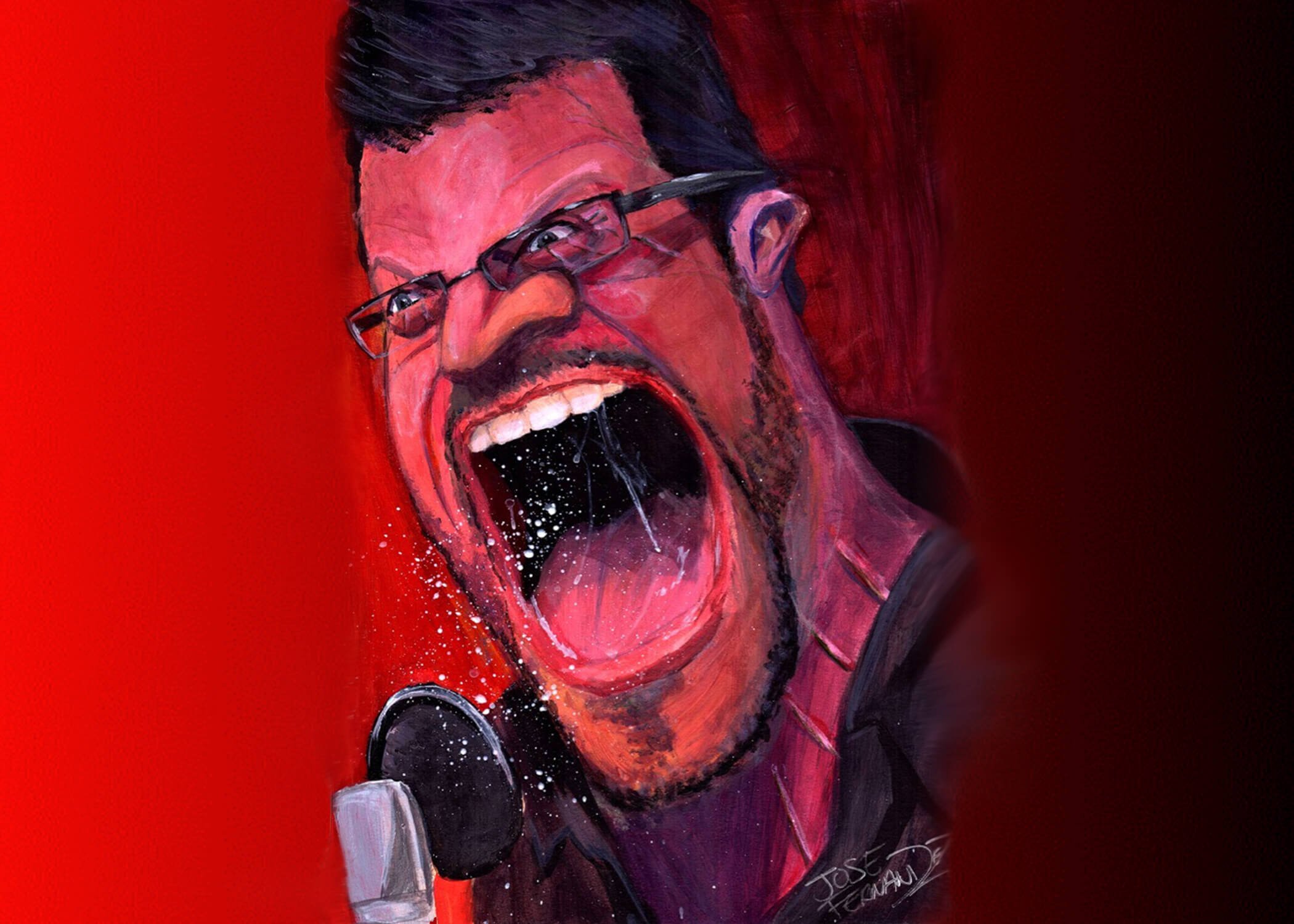Why Vent Carefully?
I’m often asked to record characters that scream, growl, roar, or simply speak very loudly. In this blog I’m going to discuss what the effects of that are on the body, and why it’s important to be careful and look after your instrument.
Support Your Breath
This is important all the time, but especially so when you’re screaming, yelling, projecting or acting in fight scenes. You need to support your breath by engaging your diaphragm. This increases the volume of air you’re able to use, and reduces the risk of injury to your throat.
You can find lots of great videos online if you’re not familiar with how to use your diaphragm to support your breath. If you’re a student you can also refer to an in-depth talk on this in Class #5: “Full Body Voiceover.” I also go into the following exercises in that class. These can help support your diaphragm and abdominal muscles:
Balloon Breathing Exercise: Inhaling through your nose each time, blow up a balloon 5 times – This adds resistance to your exhale and strengthens your abdominal and diaphragm muscles.
Chair Breathing Exercise: Sit in a chair – inhale through the nose with your hand on your belly. Allow your stomach to bulge rather than your chest to rise. Exhale slowly through the mouth.
Candle Exercise: Exhale with pursed lips while arms-length from a candle – blow it out through pursed lips as though there were a straw in the mouth. Move farther back and try again.
It’s not just about your diaphragm though. Remember everything is connected, all the way up and down. I like to think in terms of using the whole body, the whole structure, when creating a voice.
Support Your Body
When I’m exercising frequently, I have more stamina in the booth. Aside from feeling better in general, I have more energy and tend to be less sleepy – especially in the long sessions. I’m able to sustain a character for much longer without getting tired, burned out, or blowing out my voice.
Everything functions better with exercise.
Exercise also increases your lung capacity – which can help with laughing and panting scenes. Think about what it’s like to act through a running scene when you’re panting. It’s easy to become lightheaded and some people even pass out when they’re doing that. The more you exercise, the more your blood will be oxygenated. Your muscles will function more efficiently and circulation will be better which will keep you more alert. You’ll be able to pay attention better in the studio – and you won’t miss important cues – which can damage your reputation and make them less likely to hire you again. (Directors get angry when you’re not paying attention 😉
Rest Your Instrument
I mention this a lot, but sleep is really important. Those sessions where I scream my guts out, to the point I don’t think have anything left, and have sessions or auditions afterwards? There’s no way I would be able to perform if I haven’t had enough sleep. Sleep allows me to recharge and rebuild those cells that get stressed and damaged in sessions. Lack of sleep can also break down your immune system and cause you to become more susceptible to injury or illness. It’s very underrated. Please get enough sleep when you’re doing this work.
Minimize the Vent!
Don’t do it if it hurts!!! If it starts hurting within 15 seconds, stop and rethink the way you’re performing. It should not hurt. Get in touch with where your breath is coming from. Are you using your diaphragm and supporting your breath? How’s your posture? Are you pushing harder than you need to?
It’s extremely important – especially in the beginning stages of your career – but also throughout your career, to remember to support that breath. I’ve been doing this for almost 30 years and sometimes I forget! I pay the price for it. I feel it immediately. When that happens, I stop and reset, get present again, get in touch with my breath, my diaphragm, and the entirety of my body. Only then, do I continue – with greater awareness and support.
Remember, if you forget to support your breath, and you blow out your voice as a result, it could be the end of that session, and even sessions over the next week. There is also potential for permanent damage. Please keep that in mind.
A Vent Video!
Here’s some footage I shot while working on a project a couple of years ago. It’s me getting ugly during what we call a “sound set”. I’d already been recording in character for about 1.5 hours before the sound set. This might be something you get asked to do as well.
You could already be raw and then have to do a sound set immediately after! It’s a good example of why it’s so important to support your instrument.
[/et_pb_text][et_pb_video src=”https://youtu.be/yzmO1iVqwuI” image_src=”https://bvs.madebytribe.com/wp-content/uploads/2022/07/Overlay-for-Warner-Bros-Sound-Set-Video.png” _builder_version=”4.17.4″ _module_preset=”default” hover_enabled=”0″ global_colors_info=”{}” sticky_enabled=”0″][/et_pb_video][et_pb_text admin_label=”BLOG CONTENT 2″ _builder_version=”4.17.4″ header_text_color=”gcid-69eba93c-c516-4740-be86-e1eb7de1300d” global_colors_info=”{%22gcid-0cccf9cb-731e-421c-9a56-99eb04e96bd0%22:%91%93,%22gcid-2acd7e5c-8057-462c-b125-86f86c05bb5d%22:%91%93,%22gcid-e4be8fdb-3c12-4e7f-9f9b-6682eb2eff5d%22:%91%93,%22gcid-69eba93c-c516-4740-be86-e1eb7de1300d%22:%91%22header_text_color%22%93}”]
Projection!
One thing that isn’t talked about in a lot of voice classes is the fact that projection can be just as damaging as screaming. By projection, I mean when you’re speaking just a little bit louder. It doesn’t have to be a lot.
Let’s say you’re doing a scene where there’s a party going on, perhaps there’s a little music in the background and you’re one of a group of people. That’s going to put a significant amount of stress on your vocal cords that you may not be aware of right away because it doesn’t hurt right away. It can be cumulative. If you are projecting for a period of time, it can do the same amount of damage as screaming. It’s honestly the main reason I hate going to noisy bars or restaurants. Not only are conversations more difficult (especially for an older dude with some hearing loss), but it causes completely avoidable vocal strain.
Work with your Director
If there’s a part you know is particularly stressful on your voice, do it at the end of the session. Experienced Directors will let you do that because they know if they blow you out at the beginning you’re not going to have anything left for the rest of the dialogue.
Sadly, some Directors don’t know this or know this and they don’t care. It might be that the Producers are there and so they just want to get it done. Sometimes they’re on a deadline and they’ve got 20 people breathing down their neck. As the actor you’ve got to satisfy everybody at the same time, but at the end of the day the MOST important thing is your instrument and taking care of it, while also making sure you don’t damage it permanently. Work with your Director, whenever you can, and communicate what you need.
Getting Light-headed
It happens! It happens anyway! My friend and fellow bellower Fred Tatasciore and I have actually passed out in the middle of auditions and came close during sessions. We talked (and laughed!) about this in our class together (Class #41 “The Nuance of the Hulk”).
Yelling, screaming, running, panting, fighting, sometimes even laughing or crying scenes can cause you to become light-headed. Some actors choose to sit when recording. I prefer to stand. I’m able to better support my breath by doing so. IF you’re standing while performing vocally stressful stuff, it’s important to make sure that you have something to hold on to (a chair will do) just in case you run out of air and feel faint!
For Fred there are certain characters – like Yosemite Sam and Taz – that he WILL sit down for at the mic, especially when there are many pages of dialogue to get through. With the Hulk however, he still stands, because that character requires him to physically move his body in extreme ways to achieve the read. Much easier to accomplish authenticity if you give yourself space to move the body. Again, if you are going to stand through a strenuous session, make sure you have something to hold on to!
Of course I can’t guarantee that you aren’t going to hurt your voice, and I can’t give you everything you need to know in a simple blog, but I hope this brings some awareness to the different ways you can support yourself physically through the process.
For some extra support when you need it – here are my recommended products for vocal care.
You can still have fun and be careful. But please be careful! End Vent.
–Golden Throat Lozenge Cough Drops (Jinsangzi Houpian) 12 Drops (2g) X 3 Pack
–Nin Jiom Pei Pa Koa – Sore Throat Syrup – 100% Natural (Honey Loquat Flavored) (10 Fl. Oz. – 300 Ml.) (2 Packs)
–Entertainer’s Secret – Throat Relief Spray for Hoarse Voice and Dry, Scratchy, Sore Throat
–Traditional Medicinals Throat Coat 16 Ct (2 Pack)

